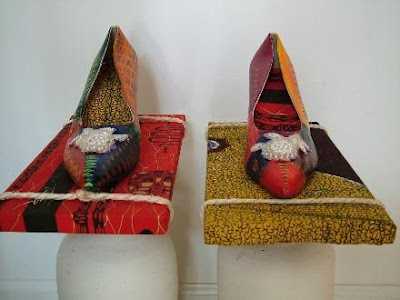A couple of newish developments in African TV services.
1. The Africa Channel. Launched in the US in September 2005, this 24/7 channel signed a deal with Comcast in the US in 2006. I hear that it is now in talks with both Sky and a South African media company as part of its globalisation strategy. Click here for the website. I'd be interested to hear from Stateside readers what they think of it.
2. Finally, a rival to DSTV in Sub-Saharan Africa. GTV will launch in the middle of this year. Their strategy appears to be pay-tv for the masses, contrasting sharply with DSTV's exorbitant monthly charge of approx 40 quid. Pasted below is an interview with the President of the owning company, taken from the current issue of Balancing Act:
African communications provider Gateway Communications this week announced that it would launch GTV, a pan-African pay-TV delivered service. By lowering the price of its service it will create some competition in what thus far has been a largely uncompetitive area. But whilst there has been much talk about convergence, this move is the first major scale, pan-African investment in broadcast content by a telecoms connectivity provider. Russell Southwood talks to Gateway’s President Julian McIntyre about what prompted this move.
GTV will provide a variety of content at a more affordable subscription to its main rival DSTV, including sport, movies, popular series, music, education and religious content. The service will carry both major international channels as well as a number of “in-house” channels. The service will also focus heavily on promoting African content.
The GTV service will be available from the middle of 2007, with a phased roll-out across sub-Saharan Africa. GTV will be targeting customers who have previously been unable to afford subscription-based services and have been limited to a small number of national free-to-air television stations.
Q: Why did Gateway choose to go into pay-TV? At first glance, it’s not an obvious move.
Let’s start with the basics. It’s a market-driven opportunity and the greatest opportunity in pay-TV globally is in sub-Saharan Africa. There are currently 4 million colour TV sets in the region but only a 1-2% take-up of pay-TV. What is happening is that penetration rates are converging globally. Africa may have different routes to market but it will not be exempt from this trend. So for example, pay-TV penetration rates in eastern Europe are currently 15-20% but will reach Western European rates of 30-40% before too long. Indeed these kinds of growth rates have been happening everywhere but Africa. There may be different cultural elements in terms of content but Africans like everyone want information, education and entertainment.
Q: I can see the opportunity buy why Gateway?
We have played a substantial role in facilitating communications penetration in Africa. We have a strong growing market in that sector that gives us a great cash flow. We see a number of opportunities to diversify into new areas. We already have a proven track record in building a successful business and we feel pay-TV is comparable to the beginning of mobile phones in the late 1990s.
Q: Are you worried that DSTV has a “a lock” on many markets at the moment?
With 1% of households taking its service, we’re not really talking about a lock on the market. If it is, it’s the kind of lock I’d like to unlock. It’s going to be about offering the right content and we’ll be making announcements on that in the near future. The content proposition will be better than DSTV. We’re making the service affordable. The current incumbents have kept pay-TV an elite product. We want a service for the masses. We want it to be a service that people will feel is part of their lives.
Q: What’s the timetable?
We’ll be broadcasting over Africa in the next few months. A commercial service will be available mid-year. There will be heavy marketing of the service in August.
Q: Which markets will you be going into first?
From day one, we will have content that is relevant to Anglophone countries. We will add Portuguese, French and content relevant to Indian communities later. We will be looking at the larger markets outside South Africa and Nigeria: these will include SADC countries and a selection of countries in West and East Africa. We will be distributing in 9-10 markets. We have content rights in every country except South Africa and Nigeria.
Q: How will you tap into the market potential?
It’s important to us that in each of the countries we operate in that we have local expertise, work with local companies and have local content. This is not a South African or European service, it’s one delivered specifically for sub-Saharan markets. We want to promote local, national and regional cultures, as well as also promoting local employment.
Q: Will you be putting money into content?
In the short-term, we will invest substantially in content rights. In the longer term, we intend to do so. The African content market and African media suffers from a lack of TV distribution infrastructure. When we’ve been talking to producers and directors they’ve been telling us that there’s nowhere to sell their work. The free-to-air television channels either lack the resources or are unwilling to do so. Existing pay-TV does not promote local content.
There is a massive opportunity to develop local media markets. We want to promote access to quality content across all genres. For example, sports in general (and football in particular) are underdeveloped because they have no income from television. Pay-TV could do a great deal more to promote local interests.
Read more...






































